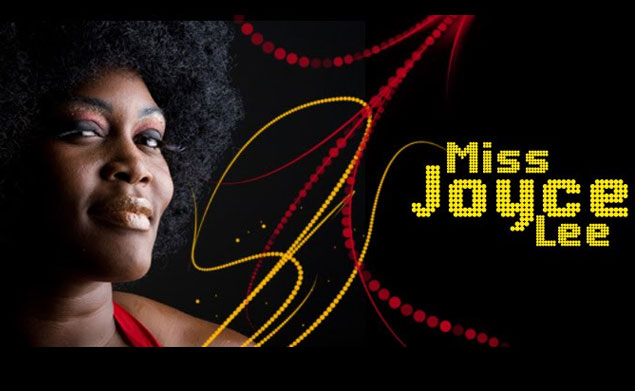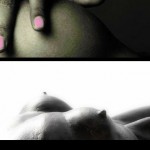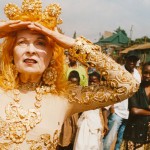Interview: Joyce Lee
Interviewed by Michelle Flowers

Poet and performer, Joyce Lee, has toured the United States and been featured at the Nuyorican Poetry Café, Yoshi’s of San Francisco, 1st Annual Oakland Gay Pride Parade, and many other spoken word events. As the winner of the 2009 en 2010 Oakland Grand Slams, she speaks with Michelle Flowers of Orijin Culture’s Indigo Thread about her influences, art as testimony and her need to grow beyond boundaries of time and space.
Q: What makes spoken word such a unique art form?
Een: The artist makes it unique. Spoken word is as ancient as storytelling or a Cathedral confessional. It makes it unique. Time and dedication to new and old truths, if we dare to tell them, make spoken word unique. There is a humbling power in being blessed enough to describe the human experience, especially as a black American womyn raised in the church. Traditionally, we are taught to serve and submit whether it be to parents, elders, pastors and/or Jesus. I have been baby sitting, styling my own hair, washing my own clothes, and making my own snacks and sometimes meals since I was eight—and my mother was and is very active in my life—active, functional and awesome, but for the most part she raised me like she was raised, and I am raised similar to how many of my black womyn friends were raised: to serve, obey, be pretty and not be heard. So to break out of that shaping, and be blessed with the words to describe the shaping and the process of breaking out of that shaping for yourself and other womyn, is a very powerful and humbling experience, particularly when that kind of testimony is referred to as Art.
Q: Who are some of the African American female spoken work artists that you look up to?
Een: To be honest, there really aren’t many that I look up to. I’m not stating that none of them are “good” but most of my heroes were before my time. But I am impressed by Mahogany Brown because she too is from Oakland, and is a spoken word artist and curates the Nuyorican Poetry Café in Manhattan, NY, she is a student and a mentor and remains accessible. I am impressed by her because she realized that she had a spotlight and could’ve stopped there and been content or selfish! Echter, she chose so much more and remains strong and sweet, which is a hard balance. I am impressed because she is a phenomenal writer, but I can describe her justly without ever mentioning it and she would still be just as interesting.
Q: Who or what are your other artistic influences?
Een: Nina Simone, Sam Cooke, James Baldwin. Arlene Eisen is a published author and friend/ mentor to me. She has been a HUGE influence to my growth and awareness as a womyn and critical thinker. I also have been influenced by Alice Walker, Zora Neal Hurston, and my mother Rolette Findley. My brother-in-law, Kevin Barnes, makes inspirational music for me to listen to and write to and music is a HUGE influence on my writing. When I’m going through a feeling, I got to put some music on that repeats the feeling in order for me to release it through my fingers, for instance: I listen to Johnnie Taylor when I write about my grandpa J.D. (may he rest in power) because J.D. always listened to Johnnie Taylor and had a jar of Jack Daniels in his hand and a sweet smile on his face when he looked at me. When I put on Johnnie, I can feel J.D. in the room and write his truth as well as mine.
Life is a huge influence on my art. Going through good and bad, loving, despising, humiliation and victories and being a warning to my nieces and my nephew. Being courageous for them and telling the world and anyone in it the same truth that I demand from them at the drop of a dime. They are really my tomorrow and I want to be a sweet taste on their tongue and a prideful arch in their back when I die.
Q: How are spoken word artists’ performance styles changing in today’s world of performance art?
Een: I have noticed that poets rarely take the gamble of being wrong. Eerlijk, most spoken word poetry—including mine—is safe. By that I mean, ja, we do touch on controversial topics, but we hide behind our surroundings and experiences. For instance, I’ve seen the most radical poetry recited in front of poets. I’ve seen the most controversial poetry said in front of judges with score cards. But it is rare that we go radical in a roomful of conservatives, holding the funds and controlling surroundings we complain about. We play it safe. I don’t know if poets have always done this, but I have been guilty of it myself and it is something I have no plans of continuing.
A good example of what I’m talking about is a recent experience I had at a very well known show in the Bay Area where a middle aged white male (comedian) decided to repeat the word “nigger” back to back again and again for a total of sixty seconds. There were about 300 people in the audience. 20 or more of them were poets. At least five of the 20 were black American poets who all have poems about racism and/or inequality that they have “won” poetry slams with. The host is a white male and prides himself on controversy, but no one spoke out against this hate-speaking comedian except me. I rushed to the stage and told the man to get off and chastised the audience for sitting in silence (uncomfortable silence) instead of speaking out against the hate speech. When I exited the stage I received pats on the back and was called a “hero.’ The next day the incident was on YouTube. I was flooded with emails from all over calling with some from the comedian’s friends calling me a “bitch” and a “nigger,” but most folks calling me a “hero.” The fact of the matter is that talk is cheap, and a lot of spoken word artists are good at talking the talk, including me. Echter, I hope I’m not the only one hell bent on exercising my leg muscles, you know?
Q: Is it a thriving art form, or is it is something that is on the decline?
Een: I was just speaking with one of my favorite poets/human beings Tongo Eisen-Martin about this very question and he said that in recent history a network of poets have created a self sustaining world and identity for spoken word. While their creation has provided a home and vehicle for hundreds of poets and thousands of fans of poetry; unfortunately this world is mired in escapism, context-less politics, patriarchy, racisme, classism etc. And even more unfortunate, this world does not have any clear desire, let alone plan, to resolve its contradictions and rid itself of its various oppressions.
Q: I understand that you are going to Africa. Have you been influenced by the spoken word arts from the Continent, or the African Diaspora in any unique and special ways?
Een: I am actually ignorant to African culture. I am going to Africa to learn and grow as a human being and writer. I feel like living an entire life in just one country (especially someone with as many privileges and blessings as I have been given) is like reading only one chapter of a book and saying you know it all. I’m also not satisfied with my intelligence level. Begrijp me niet verkeerd, I believe I am intelligent, but I have so much potential to be even greater and I deserve greatness enough to give myself and my writing the opportunity to be exposed and to grow.
Q: Where do you see spoken word going as an art form?
Een: Wherever artist take it – spoken word is only as big and wide as the artist is willing to stretch him or her self. The spotlight is only as big as our comfort zone, in my opinion, and too many of us are comfortable – and please don’t get me wrong, it takes a lot of work and hustle to get and live comfortably as an artist, but there is more required of us. We have greater works to do.
For more information, visit http://www.Joycelee.bandcamp.com of http://www.justjoycelee.blogspot.com.
Indigo Thread: Women of Vision and Purpose is a column on Orijin Blog and Magazine. The column focuses on Black women in the media and other areas of society, including social, cultural, economic and spiritual. The blog appears on Mondays, and the magazine version of the column appears in each edition of the publication. It is written by anthropologist and actress, Michelle Flowers, who is based in Los Angeles, CA.
Laatste berichten van michelle bloemen (toon alles)
- The Lark of Music: Cubaanse Soprano - November 26, 2014
- Killing Us Softly & Vaak - Februari 16, 2014
- Kellie Dantzler: Living a Life of Joy, Grace, and Purpose - Februari 25, 2013



